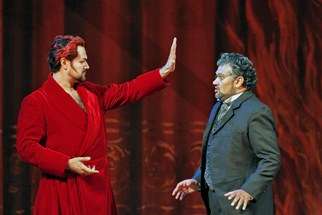|
Back
What fresh hell is this? San Francisco
War Memorial Opera House
09/06/2013 - & September 11, 14*, 17, 20, 24, 29, October 2, 2013
Arrigo Boito: Mefistofele
Ildar Abdrakazov Mefistofele), Patricia Racette (Margherita), Ramón Vargas (Faust), Marina Harris (Elena), Erin Johnson (Marta), Renée Rapier (Pantalis), Chuanyue Wang (Wagner, Nereo)
San Francisco Opera Chorus, Ian Robertson (chorus master), San Francisco Opera Orchestra, Nicola Luisotti (conductor)
Robert Carsen (production), Laurie Feldman (revival director), Michael Levine (designer), Alphonse Poulin (choreographer), Jai Altizer (costume supervisor), Gerd Mairandres (wig and makeup designer)

I. Abdrazakov & R. Vargas (© Cory Weaver)
Hearkening back to the tradition of 19th century grand opera, Mefistofele seizes the opening of the 91st season of the San Francisco Opera with verve. A confit for every taste, there is pathos for the disillusioned, ribaldry for the lascivious, pageantry for the blasé, and exquisite, bountiful stage sets for those ruing the long ago past when elaborate design was not compromised by financial constraints.
The parable of Faust, most familiar from Goethe's play, has served long as artistic interpretation. Robert Carsen and Michael Levine use the conceit of the play-within-a-play in a particularly creative fashion, portraying an impervious cosmos containing both Heaven and Hell. Paradise exists as theatre behind an omnipresent proscenium.
The music's the thing – this company's orchestra and chorus hold nothing back from the performance of this grandiloquent 19th century work. Maestro Luisotti coaxes a symphonic marathon with expression and dynamics ranging from whisper to fortissimo.
Ian Robertson's chorus is consistently well-honed, even with the additional challenge of a 30-member children's chorus. Mefistofele is arguably an oratorio and Mr. Robertson's chorus mostly performed it as such. Gifted with face time, the choristers joyfully mime as they sing; in many ways, the chorus is the star of the show.
Soprano Patricia Racette as the doomed Margherita is nearly too agonizing to witness. Her theatrical, anguished rendering of "L'altra notte in fondo al mare," with a luscious cello counterpoint, showcased her trademarks of gorgeous lyricism, sensitive phrasing, a virtuoso trill, and a beautifully colored tone.
With the exception of Ms. Racette, Russian-born bass-baritone Ildar Abdrazakov dominated as the antihero, gleefully characterizing this Master of Darkness with the rich, burnished patina of his sound interspersed with delightfully naughty humor strewn throughout the 3-1/2 hour performance.
Ramón Vargas sensitively probes the character layers of Boito's Faust as a feckless, superficial and questionably worthy gamble between the divine and the profane. Mr. Vargas subordinates his singing abilities to manifest character. Much as a theatre actor gains weight for a part, Mr. Vargas brilliantly subordinates his considerable vocal ability to portray a cavalier and easily-tempted Faust, adopting a rather thin, almost reedy tenor. As Faust spiritually matures, Vargas lends more depth to his character, supplying a fuller, richer sound to reflect his evolving spirit. Mr. Vargas may perhaps benefit from a bit of additional study of dramatic art for an even more convincing characterization.
Soprano Marina Harris, taking a turn as Elena in this performance, reflects the Merola Program’s first-rate training. An intriguing Elena, Ms. Harris' career will be noted with interest. The remaining Adlers provided enviable support. Tenor Chuanyue Wang, as the young Wagner, has a prodigious range and presence with enviable tonal accuracy and flexibility. Mezzo-sopranos Renée Rapier and Erin Johnson proffer an elegant Pantalis and a comic Marta, respectively.
The cast had many challenges to surmount in this challenging project and did so with aplomb. This reviewer was somewhat bemused by others' complaints that the changing of scenes created awkward pauses – perhaps years of digital transmission has clouded their realization that virtual reality has not (yet) overtaken the fine arts. Such pauses also gave opportunity to stretch a bit during the lengthy evening. How instructive it would be to witness the changing of the sets while the curtain is temporarily down.
Clearly the lighting designer had a monumental task of alternating the palettes of Heaven and Hell that at times became a pastiche. Dance master Lawrence Pech is accountable for the marginal performance of the ballet scenes – perplexing, since there is no dearth of talented, well-trained dancers looking for work. There were far too many wooden arms and barely acceptable leaps. Other than Faust's somewhat pathetic white suit, costumes, wigs and maquillage were consistent and appropriately elaborate.
Despite its length, complexity and detail, this splendid creation likely would benefit from a repeat attendance; one's senses are nearly overwhelmed at first viewing. The orchestral music alone is sophisticated and redolent of many influences. This opera is for a thoughtful audience; it can generate long discussions into the evening of cosmic themes and the role of mankind. Go, now, to the War Memorial Opera House before the last performance on October 2. A production such as this may not soon again reappear.
Claudia K. Nichols
|